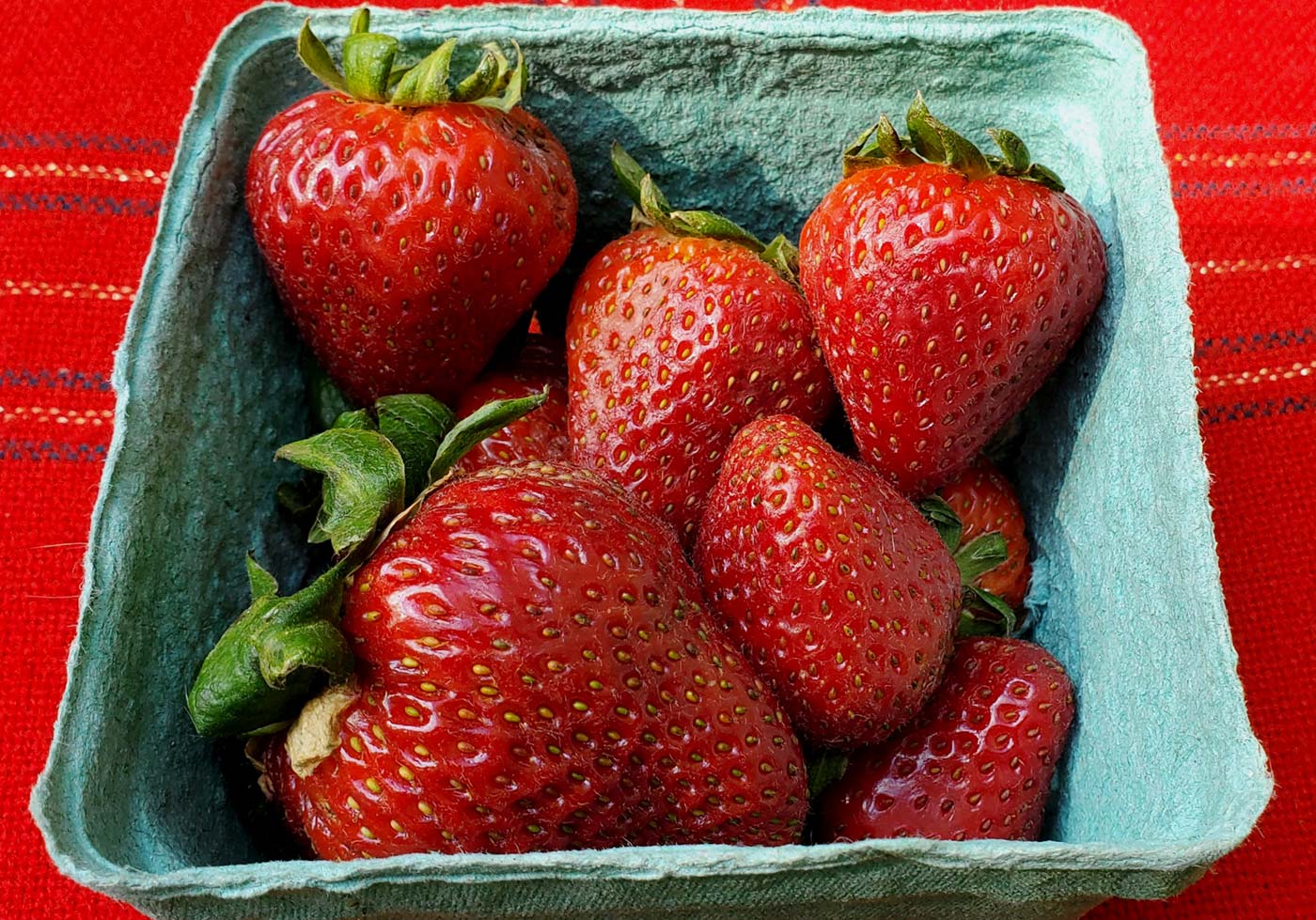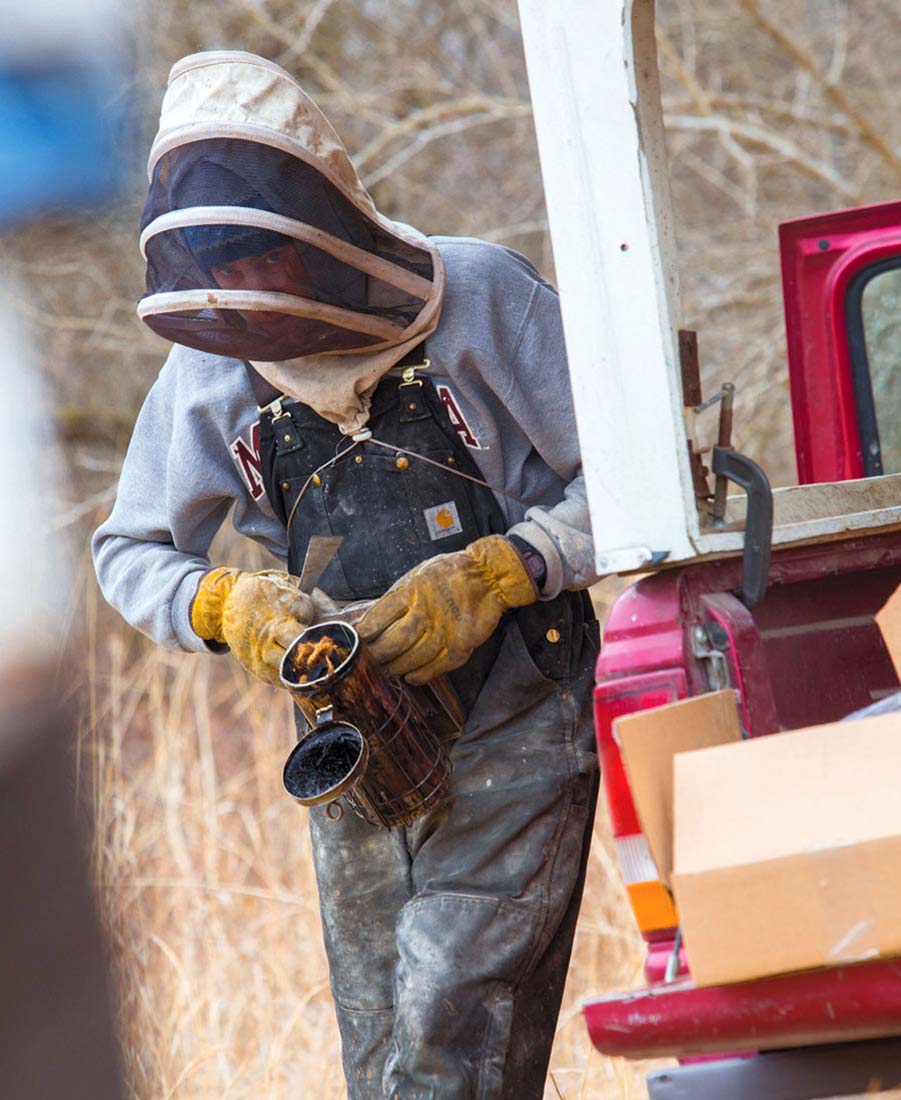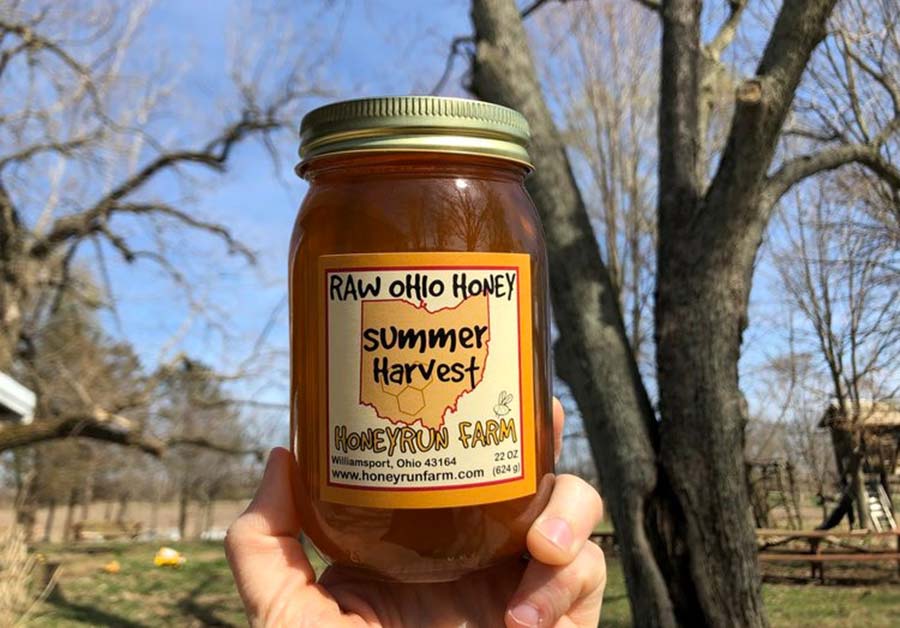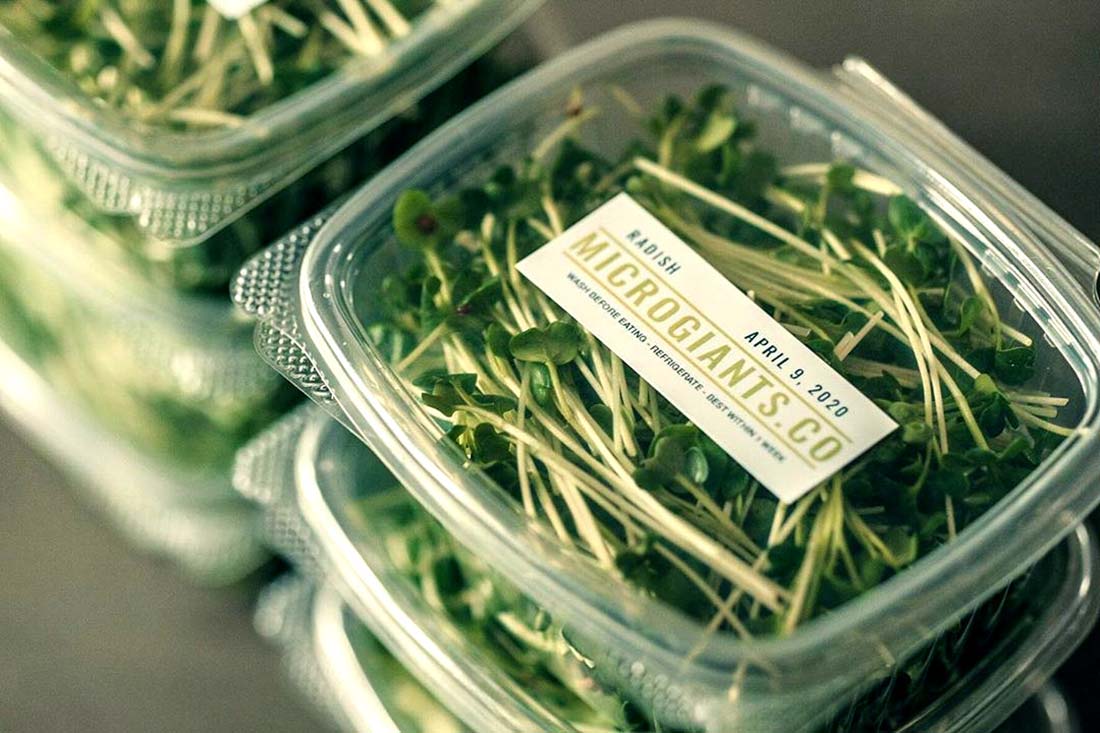Farmers Face Another Unwanted Surprise In Pandemic
Farmers are used to adapting to factors out of their control, from weather changes to fluctuating commodity prices to new government regulations. But they had never faced a shock quite like a global pandemic.
Nationally, the pandemic disrupted the food supply chain by causing major shutdowns in the food service industry—restaurants, of course, but also hotels, convention sites, school lunch programs and college dining halls. The resulting traffic jam of products resulted in some large farms dumping milk and destroying produce even as long lines formed at food pantries.
In Central Ohio, most of the farms are smaller operations with the ability to adapt more quickly. These are stories of how some farms handled the challenges of COVID-19.

Strawberries from Paige’s Produce. Photo by Edible Columbus.
FARMS CSAS: NEW GROWTH
“When we first heard that markets could be impacted, I about wore a path in our floor walking at night,” says Brian Helser of Paige’s Produce, a farm operation in Amanda, Ohio, that Helser operates with his wife, Kelly.
Helser sells most of his farm’s produce directly to consumers through a stand on his property, at several farmers’ markets in Central Ohio and through a community-supported agriculture (CSA) harvest subscription program. “How am I going to get through this?” Helser says he asked himself multiple times those first dark days and nights when COVID-19 arrived in Ohio. “Thankfully, the CSA numbers ticked up and now I have hope.”
In the CSA model, consumers agree to purchase a share of an operation’s products—generally made available through a weekly bag or box—directly from the farm for the duration of a season. This commitment gives the producer a confirmed investment upfront, allowing them to purchase seed or other inputs and grow their business.
For consumers, a CSA subscription offers a direct financial and personal connection to the local food economy. By paying a farmer directly for their services, consumers remove the middlemen from the supply chain. Additionally, in the age of COVID-19 and concerns over food safety, consumers are increasingly turning to the model due to the format’s short supply chain.
Helser says that over the last several years enrollment in his CSA program has dropped with only an average of 20 new subscribers each season, mimicking a national trend of decreasing interest in the direct farm program. However, from early April to mid-May this year—while the region bore the brunt of COVID-19 and its economic impact—Helser says he gained close to 70 new subscribers.
New restrictions, such as pre-order sales and drive-through pickup, are in place to ensure social distancing this season at some of the farmers markets where he previously manned a booth. Instead, Helser now offers some of his subscribers the opportunity to bypass lines by claiming shares at pop-up sites on front porches and yards in Central Ohio communities. Additionally, for a nominal fee, he’s also offering home delivery each week, which he says many of his new sign-ups have opted for.
Bill VanScoy, who owns VanScoy Farms in Ridgeway, Ohio, has operated a produce CSA for over 10 years. He says his CSA model—in particular, the packing and distributing of product—has been impacted by COVID-19 due to ramped up food safety requirements. He’s uncertain whether the obvious uptick in enrollment in his program is due to the coronavirus or recent changes he implemented this season allowing users to select weekly product from an online e-commerce platform. “It’s probably a bit of both,” he reflects.
However, VanScoy says that the momentum of the current moment has not been lost on him. The consensus among small-scale growers is that bottom lines are booming due to increased interest from the public in their products. Headlines tell of the perils of the industrial food system in a world impacted by COVID-19—the plowing under of crops, worker safety issues at meatpacking plants, and empty store shelves due to bottlenecks in a massive system stunted unexpectedly. As a result, consumers are seeking out sources for local food in droves.
“The biggest thing we need to act on is the wave of action for local food purchasing right now,” VanScoy says. It’s an opportunity to zero in on the advantages of buying local. “We’ve been telling people for years that through the CSA model you know your farmer—a local, secure source of food. We’re hitting that message hard right now publicly. If we don’t look at fixing the larger food system now, what happens the next time?”
—Nicole Rasul

Al Dolder, owner of Stonefield Naturals. Photo by Edible Columbus.
STONEFIELD NATURALS: RELYING ON LOYAL CUSTOMERS
Al Dolder, who sells pork from his Hampshire heritage hogs, yearns for the downtown Worthington Farmers Market where he has manned a stall for the past eight years, always with a smile and a few minutes of pleasant chat.
“I like to be in front of my customers,” says the owner of Stonefield Naturals. “I can find out what they like, get them the right cut.” And, of course, he can talk to potential new customers about his hogs. “I’m very proud of what these hogs are. I hope I have a superior product that my customers know is going to be consistent.”
An independent spirit who chafes at regulation, Dolder would set up a stand and sell his pork on the street corner tomorrow if he could. Instead, he has to content himself with the new pre-order, drive-through version of the farmers market. Because he feeds his hogs the more expensive non-GMO grain, he needs to sell direct to the customer to recoup his costs.
He allows that he has been “very fortunate” in having a small independent processor in Zanesville, who has remained open, unlike the giant corporations that can’t process the meat they have. “That’s what’s kept me going. They’ve kept everyone healthy, they’re still processing. In fact they’re booking until August and September.”
Asked if he has noticed customers buying more of any particular product, he replies, “There’s a big uptick in ground pork.” There is a shrug in his voice. “I can’t figure out why. Some Saturdays I sell 20 pounds.”
Dolder is selling roughly as much in the drive-through market as he did at the indoor winter market, but has seen added expenses. He had to hire a web tech to adapt his not particularly active website for drive-through sales. “It’s not enough,” he says. “I’m not complaining, just stating a fact.” And he sees no way to grow, pointing to the uncertainty of the model.
“You don’t know what you don’t know,” he says. “I don’t know if I can do much more [business] through the drive-through. And how do you sell produce online, when the customer can’t see it or touch it or smell it?” He will find out when he tries it this summer.
Meanwhile, he is looking for additional ways to sell his pork and “be accessible to my customers.”
Even in the best of times, farming is a gamble that depends on variables as fickle as the weather. Despite his dark words, Dolder is an optimist at heart, still planning to retool his operation to increase hog production from 50 to 200 hogs per year.
“It’s a ponderous system,” he says of the drive-through market, “but at least it’s keeping me in front of my customers.”
You can purchase Al Dolder’s Hampshire pork directly from his Stonefield Naturals Facebook page or through the Worthington Farmers Market.
—Nancy McKibben

Isaac Barnes tends to bees at Honeyrun Farm. Photo by Edible Columbus.
HONEYRUN FARM: HONEY SALES RISE
After 12 years of growing their honey business through local farmers markets, Jayne Barnes of Honeyrun Farm “panicked a little bit” when she learned that the Worthington Farmers Market would become a drive-through.
“When they emailed us, I was skeptical,” she says. “But the first week, I had 35 orders.”
Orders have increased every week. “I am truly blown away at how much people are using it. Ordering from each vendor is a lot of work, but people are doing it.”
It’s an urge that Jayne understands. “I’ve shopped more at the market than usual” in order to support other vendors, she says. And she sees an upside. “It’s a benefit to be able to go to the website and see the price. And you can take time and read about the vendor. I enjoy it.”
Because Honeyrun Farm already had a functioning website for selling and shipping their honey, the change was easy. “As soon as they switched over [to the drive-through], all I had to do was add a button that said pick up. We feel very fortunate. We’re not experiencing financial distress like farmers who rely just on the market.”
Husband Isaac agrees. “It was a crap shoot with who was lucky and who fell on hard times. When this thing started we were on pins and needles like everybody and pretty quickly discovered that the honey was selling.”
Grocery store orders tripled, with Isaac making three deliveries a week instead of one. “Even stores like Saraga, where I would usually deliver only once every six months, wanted more. Honey doesn’t spoil,” he points out, “so if people are stocking up, it’s a good item to have in the pantry.”
Jayne adds, “Everyone’s at home and they don’t want to go to grocery stores as much, so they’re buying honey to be shipped. And people are cooking at home and buying more comfort food. We do it, too—more ice cream and sweets.”
Pre-quarantine, Saturday mornings were Jayne’s social time. “Now I can only wave at our customers, but I talk to the vendors standing next to me. It’s been kind of fun. We air out our worries and concerns and ideas.”
Some concerns are “larger, long term. In the next five years, will people have the money to spend on what some people would consider a luxury item? Will people then choose not to shop at the market or buy treats” in a down economy?
Isaac chimes in. “This whole time period, my life on the farm hasn’t changed much at all. But it really hits me when I make a weekly delivery and see people wearing masks, how strange it is. I worry about the way people are acting now, not taking it very seriously. Nothing’s changed as far as the virus being out there and no vaccines. I hope things are going to turn out for the better.”
In the meantime, Isaac has enough extra work to hire a part-time employee. Their four children help a little in the honey house and take care of their 4-H animals. When asked how it’s been to have the kids at home, Isaac just laughs. “They’ve gone feral,” he says.
As for their future, Jayne has the last word. “I’m an optimist, I can’t help it.”
Honeyrun Farm sells honey, beeswax candles and soaps. Order from Jayne and Isaac directly from honeyrunfarm.com or through the Worthington Farmers Market. Their honey is also available at local grocery stores including Bexley Natural Market, The Hills Market, Whole Foods Market and Giant Eagle Market District.
—Nancy McKibben

An example of the honey for sale on the farm’s website. Photo courtesy of Honeyrun Farm.

MicroGiants shows off its products on Instagram at microgiants.co
MICROGIANTS: SMALL GREENS WITH A BIG LEAP OF FAITH
The last thing Nate Lundquist expected to do in 2020 was start a microgreens business.
But when the state of Ohio shut down and grocery stores were running out of food, he turned to his garden for relief. He pressed pause on his content and video production agency and asked himself: “Regardless of what I was doing before, what do people need right now? How can I help?”
And MicroGiants was born.
Lundquist knew he could combine his passions for content production and gardening to deliver a needed service to the Columbus community.
In March, it was too cold to grow traditional produce, so while researching viable produce options, Nate found microgreens. Microgreens grow year-round in a variety of conditions, and they go from seed to harvest in seven days.
Lundquist and his wife, Whit, began growing microgreens immediately, and the response from the community was far beyond their expectations. Within the first week in business, there were Instagram features, orders and shares of their microgreens all over social media.
The best part for Nate is seeing people enjoying his product.
MicroGiants offers one-time or weekly subscription options featuring their six varieties: sunflower shoots, radish, pea shoots, popcorn shoots, wheatgrass and a spicy salad mix.
The plants are grown in organic soil without pesticides, and their packaging is compostable.
This emphasis on good nutrition, organic food and wellness isn’t new to the Lundquists. The family is all too familiar with a world full of constant handwashing and concern for their loved ones. Nate’s daughter had two liver transplants while she was young, so having concern for an immunocompromised family member is nothing new for them.
Because of this, the Lundquists take the utmost precaution with growing the food, delivering the food and social distancing with their customers.
Moving forward, MicroGiants plans to scale up even further, reaching more people and bringing microgreens to Columbus and its surrounding suburbs.
In the future, they are thinking of expanding and shipping throughout Ohio.
The biggest takeaway from the success of MicroGiants is that it is possible to launch a business during a global pandemic, as long as the need is there.
And by showing the Columbus community why microgreens are healthy and important, Lundquist has hit a market that was waiting to be fulfilled.
A study from the University of Maryland shows that microgreens can contain up to 40 times the amount of nutrients by weight as their fully grown counterparts. In a population yearning for health, these powerful plants couldn’t be more perfect.
The theme of 2020 has been one of darkness, sickness and dreariness. But MicroGiants has proven that it doesn’t have to be. These fresh, bright and healthy greens have proven to be a light for the community.
As Lundquist says: “We’re born out of the apocalypse, and proudly grown in Columbus, Ohio.”
You can order from MicroGiants at microgiants.co.
—Christina Musgrave





